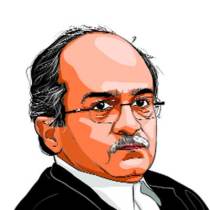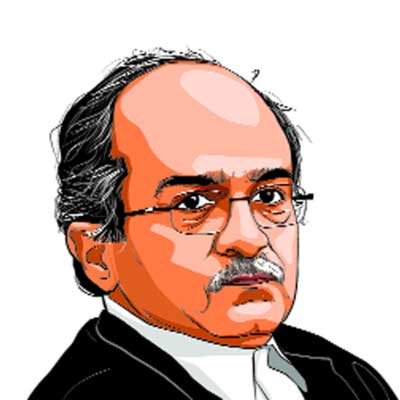King of the court
Supreme Court has let go of the opportunity to immunise the allocation of cases from abuse of power by the CJI and to democratise the process.

A convention has grown which says that the CJI is the master of roster who would allocate cases among judges of the Supreme Court. (Illustration: CR Sasikumar)
The issue of the role of the Chief Justice India (CJI) as “master of roster” for allocating benches to hear cases has become controversial recently, especially after four senior-most judges of the Supreme Court addressed a press conference earlier this year, where they accused the CJI of misusing his powers for allocating benches in sensitive cases. One of the cases they mentioned was the Judge Loya case. They also released a letter they had written to the CJI earlier, in which they mentioned the case regarding the memorandum of procedure for the appointment of judges. They expressed “great anguish and concern” at the instances “where cases having far-reaching consequences for the nation and the institution had been assigned by the chief justices selectively to benches ‘of their preference’ without any rational basis for such assignment.” The consequence of this abuse of power, they said, had put democracy in danger.
Article 124 of the Constitution establishes the Supreme Court by providing “there shall be a Supreme Court of India consisting of a Chief Justice of India and, until Parliament by law prescribes a larger number, of not more than 7 other judges (original)”. Further, the Constitution expressly confers powers on the SC under Article 145 to make rules “for regulating generally the practice and procedure of the court” with the approval of the President. The power to frame rules under Article 145 is, therefore, conferred upon the entire court. Thus, the Constitution does not give any special power to the chief justice to exclusively decide how work and cases should be allocated among judges of the Supreme Court.
However, a convention has grown which says that the CJI is the master of roster who would allocate cases among judges of the Supreme Court. In most high courts, the chief justice consults other senior judges for making a roster for each term, dividing cases by which each bench is given a subject-wise jurisdiction of cases they will hear. When there is more than one bench with the same or overlapping jurisdiction, cases are randomly assigned among those benches. The chief justice thus normally does not play any role in deciding the listing of individual cases to individual benches. This is also the situation in many international jurisdictions.
The Supreme Court Rules 2013, framed under Article 145 of the Constitution, confers powers on the registrar under Order III Rules 7 and 8 to deal with preparation of lists, fixing of hearings and petitions, “subject to the direction of the chief justice or of the court if any”. Further, it states that “subject to general or special orders of chief justice, the registrar shall publish such other lists as may be directed; list matters as may be directed and in such order as may be directed.” The role assigned to the chief justice in the rules with respect to allocation of cases is narrow and limited. However, there is a Handbook of Practice and Procedure which has a disturbing clause in Chapter XI which states that “the in-charge filing counter shall apprise the registrar (J-1) about the filing of important and sensitive cases and, if he is of the same view, he shall place such cases before the chief justice for information and order, if any”. It goes on to state that “such cases shall be listed in accordance with the directions of the chief justice, if any, or as per subject category through automatic allocation”. This clause in the handbook has been used by the registry to take politically sensitive cases to the chief justice, who has then assigned them to particular benches. One of the charges in the impeachment motion against Justice Dipak Misra was that he had allegedly “abused his administrative authority as master of roster to arbitrarily assign individual cases of particular advocates in important politically sensitive cases, to select judges in order to achieve a predetermined outcome.”
It was in this background that Shanti Bhushan filed a petition (now referred to as the Master of Roster petition) seeking that the allocation of cases cannot be decided arbitrarily by the CJI alone. This was in line with the basis on which the SC interpreted the power of the CJI in the selection of judges, to mean a collegium of senior judges of the SC/high courts.
However, the Master of Roster petition was dismissed relying upon two earlier judgments on this issue, both authored by benches presided over by the present CJI, which had held that the power to allocate cases was vested exclusively with the CJI. Both these judgments were vitiated due to the rule of conflict of interest or bias.
The first was in the petition filed by the Campaign for Judicial Accountability and Reforms, seeking an independent investigation into the medical college bribery scam which was being investigated by the CBI, in which the charge was that an attempt had been made to bribe functionaries of the court. That petition and an allied petition were mentioned before Court No 2, that directed the allied petition to be listed before the five senior-most judges of the SC. However, the CJI listed the campaign case before a division bench that directed the matter to be placed before the CJI himself, who then went ahead and constituted a bench presided by him to hear the case. In that case he himself decided that the CJI alone could allocate cases and that therefore the order of Court 2 that the case be listed before five senior judges was illegal. He then proceeded to list the case before a bench of three junior judges who dismissed the petition.
The second case relied upon in dismissing the prayers in the Master of Roster judgment is the curious petition of one Asok Pande, suddenly taken up for hearing, which lasted less than three minutes, days after Shanti Bhushan’s petition was filed and when the petition was still being numbered by the registry.
The CJI had been made Respondent No 2 in Shanti Bhushan’s petition and instances of his arbitrary and malafide allocation of cases were detailed. The secretary general of the SC was informed that since the CJI is himself involved in this case, the matter must not be placed before him for allocating a bench to hear this matter. Yet, it appears the matter was placed before the CJI and came to be assigned to a bench of Justice A K Sikri (Court 6) and Justice Ashok Bhushan. This bench has, unfortunately, dismissed the petition. The judgment rejected the wisdom by which the judges cases had extended the meaning of chief justice to mean the “collegium” of senior judges in matters of appointments and thereby its extension to the collegium also determining the roster of cases in the SC.
It is unfortunate that the SC has let go of an opportunity to immunise the allocation of cases from abuse of power by the CJI and democratise the process. Concentration of this power in the hands of one person can have serious consequences for democracy and for the rights of citizens.
The writer is an advocate at the Supreme Court and convenor of the Campaign for Judicial Accountability and Reforms
For all the latest Opinion News, download Indian Express App
More From Prashant Bhushan
- A transparency deficitThe allegations by the judges also raise serious doubts about the independence of the judiciary, given that an estimated 45 to 70 per cent…
- A new (agri)cultureUnless we quickly get our act together, we must be prepared to face the consequences. In any food crisis, it is the top of the…
- A Moment Of ReckoningTo preserve judiciary’s independence, appointment process must be transparent..








































No hay comentarios:
Publicar un comentario